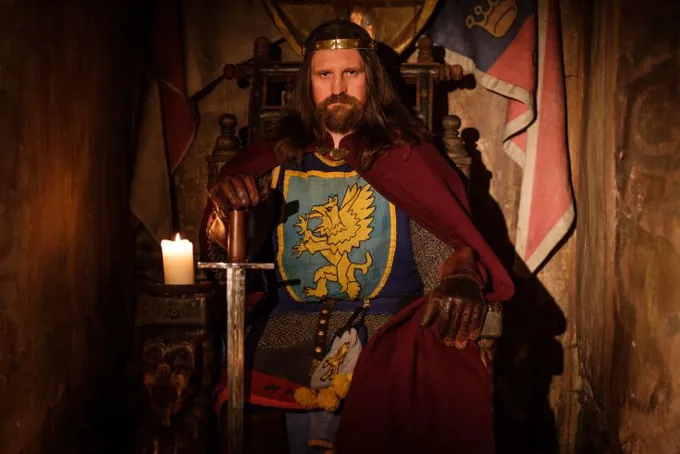
Using a King’s Grant to Prove Private Ownership of Bottomland in Navigable Waters
Subject to certain exceptions, Virginia law is that the Commonwealth of Virginia owns the bed of the rivers, creeks, bays and the sea all throughout the state.[1] This article examines one exception – private ownership of bottomland based on a King’s grant. During the time when the English Crown owned what is now the Commonwealth of Virginia there were a relatively few instances where the King conveyed riverbed, creekbed, baybed, or seabed. Each had the effect of shifting ownership of that bottomland from government to private hands.
The Power Held by the Bottomland Owner in Navigable Waters
If a person owns the bottomland in a navigable waterway, he or she can prevent others from oystering, fishing, loitering, anchoring or wading there, but nevertheless must allow passage and navigation by the public.
How to Find a King’s Grant
A great number of King’s grants were issued between the time of England’s initial colony in Jamestown, Virginia, through the Revolutionary War. The vast majority are recorded in the Patent Books in the Virginia State Archives. Nell Nugent’s Cavaliers and Pioneers: Abstracts of Virginia Land Patents and Grants is another useful resource. This multi-volume set has abstracts of the records of the colonial land office.
Very Few King’s Grants Convey Bottomland
Although a great many King’s grants were issued during the 169-year time period when Virginia was under dominion of the English Crown, almost all such grants conveyed upland. Relatively few conveyed bottomland. Then, as now, there was strong reluctance to allow private ownership of bottomland because it was believed the Crown held title to bottomland in trust for the benefit of the public, a legal right known as jus publicum. Preserving public ownership of this resource is the only way to safeguard the public’s right to right to fish, fowl, hunt and take and catch oysters.
The Crown adhered to this practice as far back as the 1607 charter it issued to Sir Thomas Gates (and others) when it was proposed that they would establish the first colony in America. The Crown conferred a broad jurisdiction on the entity that would govern the colony, a jurisdiction that included “the lands, soils, grounds, havens, ports, rivers, mines, minerals, marshes, waters, fishings, commodities”. Although the governing entity held power over bottomland, the King stripped that entity of the ability to convey bottomland into private ownership. Instead, the entity was authorized to issue “letters patent under the great seal of England [that would convey] lands, tenements and hereditaments”, but not bottomland. The Crown used a similar approach in the charters it issued to the London Company in 1609 and 1612.
This same thinking is carried forward in modern-day Virginia law. A broad right of jus publicum finds expression in Virginia Code §28.2-1200 which states that “the beds of the bays, rivers, creeks and the shores of the sea [should] be used as a common by all the people of the Commonwealth for the purpose of fishing, fowling, hunting, and taking and catching oysters and other shellfish.” It is true that §28.2-1200 acknowledges that bottomland may be conveyed into private ownership but §28.2-1200.1(A), which was enacted in 2007, forbids the Commonwealth to “convey fee simple to state-owned bottomlands covered by waters” while still allowing the state to grant leases, easements, or other limited interests in these bottomlands.
The Virginia Supreme Court is Receptive to Bottomland Ownership by Way of a King’s Grant
The Virginia Supreme Court, in the 1983 case of Commonwealth v. Morgan, was asked to decide whether Deborah Morgan held title to bottomland in a navigable creek in a tributary of the Rappahannock River known as the west branch of Carter’s Creek in Lancaster County, near Irvington. A certain Daniel Cook was oystering on that bottom under the authority of a lease that the Virginia Marine Resources Commission (VMRC) issued to him. Virginia code §28.2-101 gives the VMRC jurisdiction over all state-owned bottomlands in the Commonwealth. The VMRC claimed it was appropriately administering that jurisdiction when it granted the oyster lease to Cook. Morgan, for her part, sourced her ownership claim to a Patent that Colonial Governor Berkley issued to John Carter in 1642, and two other Patents issued in 1653 and 1663, all recorded in the Patent Books of the Virginia State Archives. The Court rejected the VMRC’s claim that the Patents did not convey bottom, and likewise rejected the VMRC’s further argument that, even if the Patents purported to convey bottomland, they were ineffectual as to that purpose because the King lacked authority to convey the bed of the creek. The Commonwealth v. Morgan Court held that Ms. Morgan owned the parcels of bottomland she claimed in Carter’s Creek, and that she had the power to prevent Cook from oystering there.
The Virginia Supreme Court case of Kraft v. Burr in 1996 reinforced the teaching of Commonwealth v. Morgan. Ethridge Burr claimed he owned a portion of the stream bed under the Jackson River in Alleghany County, Virginia, under Crown Patents, issued in the 1700’s, that “conveyed property on both sides of the river, and included the stream beds in the metes and bounds descriptions.”[2] Accordingly, Burr posted signs prohibiting fishing at that location. Charles Kraft was a professional fishing guide who fished the Jackson River adjacent to the land where Burr had posted those signs. Kraft’s legal strategy was more nuanced than the arguments the VMRC advanced to the Court in the Commonwealth v. Morgan case. Kraft did not contest that the Patents conveyed bottomland. Rather, his theory was that the Patents did not convey exclusive fishing rights and, moreover, it was beyond the power of the king to convey exclusive fishing rights because such rights are part of the jus publicum. The Virginia Supreme Court, over the dissenting opinions of three justices, issued an injunction forbidding Kraft from fishing or wading in the water flowing over the streambed owned by Burr.
Taken together, these cases make clear that the courts of Virginia will honor a private party’s claim to own the bed of a river, creek, bay or the sea if the person produces a King’s grant plus all conveyances in the chain of title, culminating in the deed that conveys title to the present owner. This is not the only method to establish title founded on a King’s grant but it is certainly the best. These cases show that, if a person goes to the trouble of establishing bottomland in a navigable waterway, he or she can prevent others from oystering, fishing, loitering, anchoring or wading there, but nevertheless must allow passage and navigation by the public.
Waterfront Property Law Services in the Commonwealth of Virginia
The attorneys on our Waterfront Property Law Team have strong connections and significant legal experience. As you can tell from the time a few years ago when one of our attorneys removed his shoes and got in the water to fend off a criminal enforcement action being filed against our client, we go the extra mile for our clients, if that is what is needed to get the job done.
Contact Jim Lang if you would like to see him publish more information on the rights of waterfront property owners in the state of Virginia. Of course, you can always contact Jim for his advice and assistance in connection with needs specific to your particular situation.
[1] The beds of lakes and ponds in Virginia are all privately owned. The same is true for bottomland in man-made canals and in non-navigable rivers and creeks. There are also a small number of instances where Virginia has conveyed state-owned bottomland into private ownership.
[2] Quoted language found in volume 252 of the Virginia Supreme Court Reporter at page 275.
